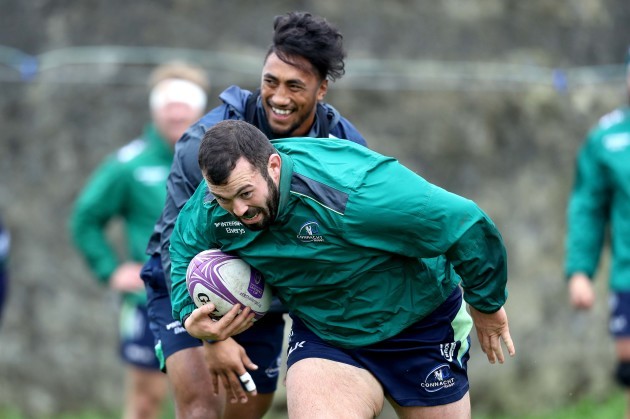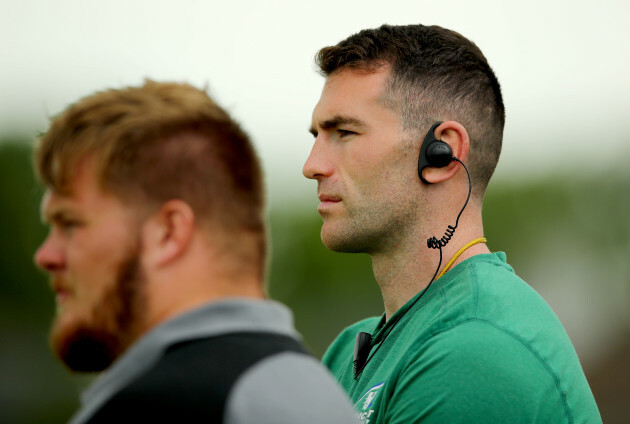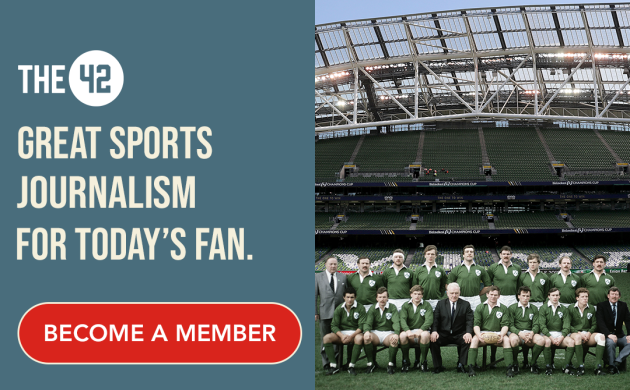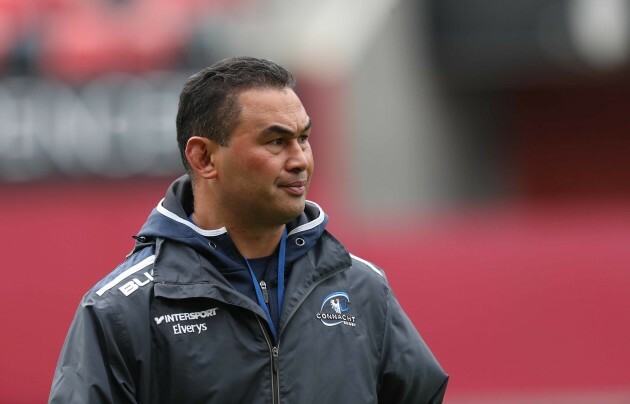'I can’t set up a maul in an office. Rugby was my release'
Sportsground favourites, JP Cooney and Andrew Browne, soldiered for Connacht for many seasons; now they reside on opposite sides of Galway’s big AIL rivalry.
by Maurice Brosnan
THE PHONE RINGS. JP Cooney has been waiting for the call. He excuses himself and takes it, while his friend and former Connacht team-mate Andrew Browne remains seated in a bustling Salthill cafe.
For seven years, they soldiered alongside each other in green until injury ultimately forced both to retire in 2018 and 2019 respectively.
Now they reside on opposite sides of Galway’s big AIL rivalry. Browne is head coach of Galwegians, Cooney with Corinthians. They have come together to discuss that transition from playing to coaching.
“I normally never answer my phone when with people,” Cooney offers apologetically.
“Yeah, never,” agrees Browne.
They exchange a knowing look. Cooney steps outside, while Browne chats idlly about the Six Nations and the weather. Eventually, the former prop returns and lets out a muted sigh. It was not the phone call he had been waiting for.
“I had a tumour removed over Christmas on one of my testicles,” he explains. “I’m waiting on a call from the hospital for a follow-up now. They removed it there in NUIG, in the university hospital. It was a real fucking rattle, to be honest.
“I found out the day before we played Blackrock away. It got to me. I didn’t want to tell Sarah or my parents. They are at home in Tipp and they were travelling up on the Sunday. I just said I’d wait and tell everyone then. So, I went up to Blackrock and you pretend all is normal.
“It was tough, but it actually helped to have some bit of normality. The lads put in a great performance which made for a bit of good news on a shitty weekend.”
It all started with a puppy’s paw. A present for his mother, Cooney had the dog on his lap when a stray foot hurt much more than it should have. Two weeks later, his daughter was born. He made use of the paternity leave to visit Connacht’s team doctor and get some blood tests done. A few days later he got the results: “red hot”.
Then there was surgery, more time off work and a wait. The biopsy results will determine treatment. That is the next step and the toughest part: waiting.
“I may not even need chemo. It is just whatever comes now. Whatever has to be done has to be done.
“I don’t know what is facing me yet, which is weird. It could be intravenous, or it might be a tablet. It all depends on what the oncologist says.
“It is so much more common that you think. That’s why you have to be open about it. I got so many messages: ‘I had this and made a full recovery’. Lads who went back and played some rugby. A friend had the same thing. I didn’t know but he rang me and told me after I got it. He had chemo for five months, lost all his hair, eyebrows, hair on his head. He had a really hairy back, that was all gone.”

“You could do with that,” laughs Browne. He has sat quietly up until this point, nodding gently. Silent and supportive. Connacht’s close-knit culture perseveres even post playing.
Their journeys to the province were starkly dissimilar. Browne’s was the typical tale; an academy product born and raised in Galway. Cooney’s route was more complicated.
His devotion started at Thurles rugby club. Flirtations with the Munster academy came to nought and eventually the plan was to pursue a teaching degree while playing in the AIL. Impressive showings there prompted Connacht to reach out and he joined in 2012.
Some great days together followed. The 2012 Champions Cup win over Toulouse. The 2016 Pro12 final win against Leinster. Brief moments of euphoria that made the hardship worth it. And there was hardship, particularly at the end.
Andrew Browne’s final season was restricted to one single appearance. It started with an Achilles injury that refused to heal and when it finally did, his AC joint separated. At 31 years of age, he called it a day.
“I feel way better now,” he says with hindsight. “I said it to JP the other week, the effect it has on you mentally. Waking up in the morning constantly sore. I was in a bad mood immediately for my entire last year. I’d my Achilles problem, JP had his hamstring. Coming in every day working on it.
The last couple of years especially. It was niggle after niggle. Injury after injury. It gets you down eventually.
“I left the game and immediately I lost a load of weight, unintentionally. You just don’t have that load anymore. I mean I still have the odd niggle, shoulders and knees will always be bad. But I’m grateful of how well I feel now.”
The cruel consequence of a serious injury. As much as it does to the body, it does more to the mind. Cooney is a testament to that. In May 2017, he made his 50th appearance for the club against Munster as a 27-year old. Shortly after he suffered an ankle injury. He had only recovered and there was a hamstring issue. Surgery was required in December.
He would never play for the province again.
“That injury wrecked me. Totally ruined me mentally,” he says.
“I mean the recovery, I had surgery three days before Christmas. I spent Christmas lying on a coach. I’m a big guy. It is not easy to navigate around on one leg.
“One leg was bent at 90 degrees with a brace locked in that position. I remember the struggle of washing myself. I went home in Tipperary because we had a walk-in shower.
My mam, she could put in a chair for me and that was literally the only way I could do it.
“Where my tendon severed from my hamstring is right beside the sciatic nerve. Obviously, there is the muscular pain and the tendon, but I was getting these pains from the nerve as well. It was honestly like hell. I could be asleep at two in the morning and it felt like someone stuck a cattle prod into the side of my leg. This electric shock going through you.
“I was taking tablets to try and deal with that, but then you are walking around the place like a zombie. It is damned if you do, damned if you don’t. I didn’t walk properly for 10 weeks. Even at that I had a limp for a long, long time.”
The duo hail the work done by Connacht, crediting the medical team and the player development manager. Club transition coach Dr Deirdre Lyons oversaw personality profiles and aptitude tests to determine the best avenue post-playing. They both scored high in empathising and dealing with people. Coaching was an obvious next step.

Former Ireland international and current Connacht coach Johnny O’Connor recommended Cooney for the Corinthians job. Browne went back to his boyhood club while the province also integrated him into academy coaching.
Few universal truths emerge from this entire conversation. Coaching is a subjective, mercurial experience. Cooney cites the difficulty in moving from the back to the front of the bus. The fear of being ‘a killjoy’. He is in favour of a clear separation. Browne differs and sees room for integration provided it is on the coach’s terms. He cites Galwegians pre-Christmas trip back from Wanderers where he found himself mingling amongst the rest of the squad at the back, with a bottle of Buckfast proving the perfect tonic.
Then there is their relationship with the game. More specifically, playing the game. Browne is totally content with being finished. Cooney still has qualms.
“I completely agree with everything Browney said earlier about the physical pain,” he explains.
“The hurt. All of that craic. The mental thing of not being picked, contracts constantly up for renewal, not knowing what will happen. All of that resonates.
“But at the same time, I’d give diamonds to go back and play rugby. I would often stand on the pitch at Corinthians as the lads are about to start a warm-up and think ‘I’d love to be playing today’. That is just me anyway. I find it was my outlet. To express, I mean… right now I have a job and work in an office. I can’t set up a maul in an office, do you know? There is no tackling or hitting a ruck. It was my release.
“In an office you can barely curse, understandably. You have to be so careful of how you let out your frustrations. I can’t stand up and kick a chair. Rugby was my release. I think back to Tuesday morning contact sessions. Mauling, scrummaging. Coming off I would be tired and sore. My ear could be in bits, my back would be tight and I absolutely loved it.
“I just loved it. Some people go out and walk dogs every day. Whatever. That was my vent.”
Browne immediately and wholeheartedly disagrees. The joint wearying. The nerve numbing. The uninterrupted ache. It grinds you down. He had enough.
“I’m the opposite. I knew my time was up. I had no interest in it.
“The more I was away, the less I wanted to go back. I knew I was done with it. I am standing in training and watching matches now and I’ve no interest in being out there. The only thing I miss is that feeling after, that reward when you put yourself through a lot of hard work.
“But watching training and the Connacht lads now, I think of Monday meetings. The cardio sessions. Double session Tuesday. Mauling in the morning, another session in the evening. I’d have no interest in that.”
The view from the sideline is a complicated one. Victory remains sweet, but defeat is crushing. A sense of responsibility they couldn’t even contemplate during their playing careers. Browne is visibly excited as he reflects on new emotions.
“All the credit should go to players, but a win is seriously satisfying. You could implement something in the week, like I did with a lineout move against JP there, I knew they would bite in at the front of a lineout and we scored off it. They still beat us quite well, but it is those little wins that you never got before.

“You take wins better. At the same time, losses are harder. Really fucking hard. Everything falls on you.”
One of the most difficult aspects of it all is the constant learning. Not in the overused cliched sense of the word; genuine, day-by-day learning.
There were the coaching badges which they did together. Lectures on those courses which they gave together. Browne lets out a hearty laugh as he recalls one particular Cooney presentation. A South African onlooker took it upon himself to rigorously challenge each and every detail. The ensuing debate was explosive.
“One of the funniest things I’ve ever seen,” he declares with a chuckle.
“That’s gas,” responses Cooney. “One of the funniest things I ever saw involved you to. It was last year when Ger Earls, Keith’s father, bounced you flat on your back during a game of touch.”
The hardest part of coaching? They are both in full agreement: changing a culture.

Browne came back to a club that had suffered three relegations in four years. This was a world of amateurs, not professionals. What they knew to be second nature now had to be instilled. Thankfully, past experiences equipped them to do so.
“We learned from Pat (Lam) in Connacht and you can see it again in Bristol now,” Browne says. “So much of coaching is about building an environment. It is really hard in the AIL, as we have found out.
“Every club has its habits. Take or leave training, if they look out the window and it is raining some might not fancy it.
“Not giving an excuse is the worst thing. That should be non-negotiable. if you are not coming or have something on, fine. This is the AIL and lads need to have some craic. But text the group and say it. That is harder said than done for some. You need lads to do that. Be accountable.”
Then there is the tiresome task of keeping up with the game. There was a recent catch-up over coffee with current Connacht outhalf Jack Carty that left Cooney dumbfounded. Midway through their meeting, the Ireland international pulled out his phone with a video of a specific defensive system.
“I couldn’t even comprehend it until he explained it to me. I had so many questions.”
Hours spent playing the game have been replaced by days spent watching it. For JP Cooney, that means infuriating his parents and partner as he pauses and rewinds, constantly on the lookout for applicable concepts. Andrew Browne spends more time watching rugby now than he ever did.
The former second row still wants his future to be wrapped up in rugby, yet he knows it is a double-edged sword.
“I would love to (stay in coaching) but the reason I am doing a masters right now is because coaching is so fickle. More than playing. Man, I had 12 years of one- and two-year contracts. It gets you in the end.
“There is a lot of me that cries out for a bit of stability in my job. At the same time, I’d love to coach as a job. That is a dream. Once I get this masters done, who knows?”
Cooney is similarly battle-scarred.
“I’m blessed right now in that I have the best of both worlds. I have my career but at the same time I am coaching senior rugby. I am still involved in the game. God only knows what is around the corner sure. I learned that the hard way. You don’t know what is in store for you.”
They live in a world of few constants, but rugby will always remain one of them.